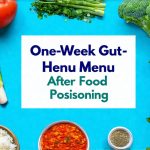The aftermath of intestinal flu (gastroenteritis) or food poisoning can be truly debilitating. Beyond the initial vomiting and diarrhea, many individuals experience lingering effects like abdominal discomfort, bloating, fatigue, and a general sense of unwellness that can disrupt daily life for days – even weeks. These symptoms aren’t simply the body “getting over it;” they represent a disruption to the delicate ecosystem within our gut. The intense purging associated with these illnesses often strips away beneficial bacteria alongside the harmful ones, leaving the intestinal tract vulnerable and potentially impacting its ability to properly digest food, absorb nutrients, and maintain immune function. Understanding how to support gut health during this recovery period is therefore paramount for a faster, more complete return to well-being.
The conventional approach often focuses on rehydration and bland diets – vital steps, certainly – but increasingly, healthcare professionals are recognizing the significant role probiotics can play in restoring intestinal balance after such events. Probiotics, live microorganisms that confer health benefits when consumed in adequate amounts, aren’t a quick fix, but they represent a proactive way to help rebuild the gut microbiome and accelerate recovery. It’s important to note that choosing the right probiotic and understanding how to use it effectively are crucial for maximizing its potential benefits; simply taking any probiotic isn’t always helpful. This article will delve into how probiotics can support recovery, what types may be most beneficial, and practical considerations for their implementation post-intestinal distress.
The Gut Microbiome and Its Disruption
The human gut is home to trillions of microorganisms – bacteria, fungi, viruses, and others – collectively known as the gut microbiome. This complex community isn’t just passively residing within us; it’s actively involved in numerous essential functions: – Digestion and nutrient absorption – Immune system regulation (approximately 70% of our immune cells reside in the gut) – Production of vital vitamins like K and B vitamins – Protection against harmful pathogens. A healthy microbiome is characterized by diversity – a wide range of different microbial species coexisting in balance. When intestinal flu or food poisoning strikes, this delicate balance can be severely disrupted. The vomiting and diarrhea associated with these illnesses flush out both good and bad bacteria, reducing overall microbial diversity and potentially creating an environment where harmful bacteria can proliferate. This imbalance, known as dysbiosis, contributes to prolonged symptoms like bloating, gas, abdominal pain, and altered bowel habits. Furthermore, a compromised gut microbiome weakens the immune system’s ability to defend against future infections.
The extent of disruption varies depending on the severity of the illness and individual factors, but even mild cases can significantly impact the microbiome. It’s not just about losing bacteria; it’s also about altering their composition. Certain beneficial species may be disproportionately affected, leading to a less resilient and functional gut ecosystem. This explains why some individuals experience prolonged post-infectious irritable bowel syndrome (PI-IBS) – a chronic gastrointestinal disorder that can develop after an acute intestinal infection. Restoring microbial balance is therefore key to mitigating these long-term effects and accelerating the return to optimal digestive function and overall health. Probiotics offer a targeted approach to achieve this, though careful selection and timing are paramount for effective results. Considering a building a recovery plan can also be beneficial during this time.
How Probiotics Aid Recovery
Probiotics work through several mechanisms to support gut recovery after illness. Firstly, they can help repopulate the gut with beneficial bacteria that were lost during the acute phase of illness. While probiotics don’t simply “replace” the entire microbiome (it’s an incredibly complex ecosystem), they can introduce strains known to be particularly helpful for digestive health and immune function. Secondly, they compete with harmful pathogens for resources and adhesion sites in the gut, inhibiting their growth and reducing their ability to cause further damage. This competitive exclusion helps restore a more balanced microbial environment. Thirdly, probiotics produce substances like short-chain fatty acids (SCFAs), which are essential for nourishing the cells lining the intestinal tract and promoting gut barrier integrity. A compromised gut barrier allows harmful substances to leak into the bloodstream, exacerbating inflammation and contributing to symptoms like bloating and abdominal pain.
Furthermore, certain probiotic strains can directly modulate the immune system, helping to dampen excessive inflammatory responses that often occur after an intestinal infection. This is particularly important in preventing the development of PI-IBS, where chronic inflammation plays a significant role. It’s crucial to understand that different probiotic strains have different properties and effects. Some are more effective at reducing diarrhea, others at alleviating bloating, and still others at boosting immune function. Therefore, choosing a probiotic with strains specifically researched for post-infectious recovery is essential. The goal isn’t just about adding any bacteria; it’s about strategically introducing beneficial microorganisms that can address the specific imbalances caused by the illness and promote restoration of gut health. Understanding detecting delayed food reactions can help you better understand your body’s response to foods after recovery.
Choosing the Right Probiotic Strain
Selecting the appropriate probiotic strain(s) for post-intestinal flu or food poisoning recovery requires careful consideration. While many probiotics are marketed broadly, research suggests certain strains may be more effective in these situations. Lactobacillus rhamnosus GG and Saccharomyces boulardii have both been extensively studied for their ability to reduce the duration and severity of diarrhea caused by infectious agents. – Lactobacillus rhamnosus GG is known for its resilience and ability to adhere to the intestinal wall, offering a sustained beneficial effect. – Saccharomyces boulardii, a non-pathogenic yeast, helps neutralize toxins produced by harmful bacteria and strengthens the gut barrier. Other strains showing promise include certain Bifidobacterium species (like Bifidobacterium infantis) which can help restore microbial diversity and support immune function.
It’s important to avoid probiotics containing multiple strains if you are severely weakened or have a compromised immune system; introducing too many new microbes at once can sometimes overwhelm the gut. Start with a single-strain probiotic initially, observing how your body responds before considering adding more. Look for products that clearly state the colony forming units (CFU) per dose and ensure they contain live and viable microorganisms – some probiotics lose potency over time if not stored properly. Checking for third-party testing certifications can also provide assurance of product quality and accuracy. Remember, probiotic supplements are not regulated to the same extent as pharmaceuticals; therefore, choosing reputable brands with a proven track record is essential. Digestive recovery is also a key component of overall wellbeing.
Timing & Dosage Considerations
The timing of probiotic administration is crucial for maximizing its benefits. While it might seem logical to start probiotics immediately after the onset of symptoms, research suggests that starting them after the acute phase (when vomiting and diarrhea are significantly reduced) may be more effective. This is because during active purging, probiotics may simply be flushed out of the system before they have a chance to colonize or exert their effects. Once your digestive system has calmed down somewhat, probiotics can then effectively adhere to the intestinal wall and begin restoring microbial balance. Start with a lower dose initially – perhaps half the recommended dosage on the product label – and gradually increase it over several days as tolerated.
Dosage recommendations vary depending on the specific probiotic strain and individual factors. Generally, dosages for post-infectious recovery range from 5-10 billion CFU per day for Saccharomyces boulardii to 10-20 billion CFU per day for Lactobacillus rhamnosus GG. It’s essential to follow the manufacturer’s instructions and consult with a healthcare professional if you have any concerns or underlying health conditions. Probiotics are generally well-tolerated, but some individuals may experience mild side effects like gas or bloating initially. These symptoms usually subside within a few days as the gut microbiome adjusts. Continue taking the probiotic for at least 2-4 weeks after your symptoms have resolved to support long-term gut health and prevent relapse. Safe ways to test food tolerance are also important for recovery.
Beyond Probiotics: Holistic Recovery Support
While probiotics are valuable tools, they’re just one piece of the puzzle when it comes to recovering from intestinal flu or food poisoning. A holistic approach that encompasses dietary modifications, hydration, and rest is essential for optimal healing. – Rehydration: Replenishing fluids lost through vomiting and diarrhea is paramount. Electrolyte solutions can help restore mineral balance. – Dietary adjustments: Start with a bland diet consisting of easily digestible foods like bananas, rice, applesauce, and toast (the BRAT diet). Gradually reintroduce other foods as tolerated, avoiding fatty, spicy, or highly processed items initially. Fermented foods like yogurt (with live cultures) and kefir can provide additional probiotic benefits alongside supplementation. – Rest: Allowing your body adequate rest is crucial for immune function and tissue repair. Avoid strenuous activity until you feel fully recovered.
Furthermore, managing stress levels can also support recovery. Stress can negatively impact gut health and weaken the immune system. Practices like deep breathing exercises, meditation, or gentle yoga can help reduce stress and promote overall well-being. Consider incorporating prebiotics into your diet – these are non-digestible fibers that serve as food for beneficial bacteria in the gut. Sources include onions, garlic, asparagus, and bananas. Finally, remember to listen to your body and adjust your recovery plan based on your individual needs and tolerance levels. If symptoms persist or worsen, consult a healthcare professional for further evaluation and guidance. Consider using gentle cooking methods to ease the gut load during recovery. You may also benefit from food journaling to identify triggers. Finally, gentle spices and herbs can support digestion without causing further irritation.


















